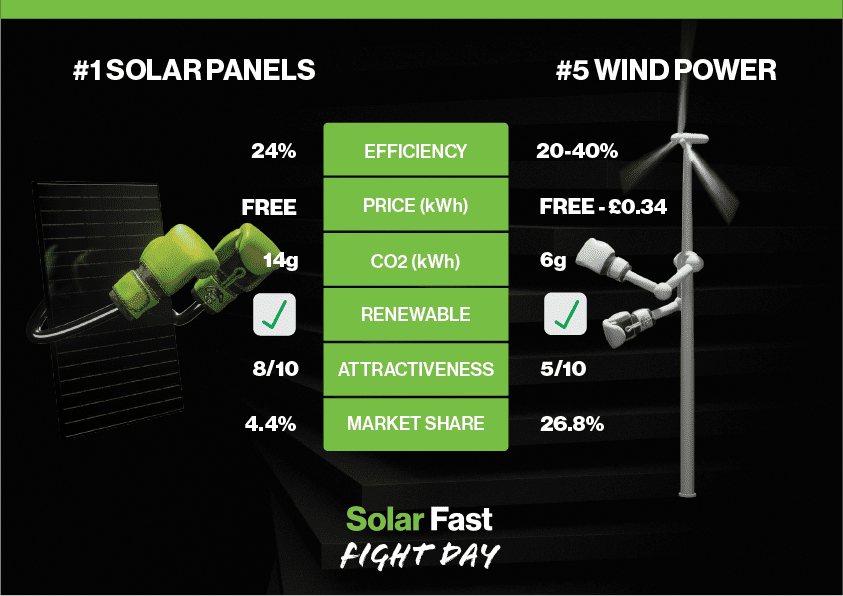Going green and being self-sufficient in energy doesn’t tie you to one kind of renewable or another.
We wouldn’t suggest trying to involve yourself in tidal, wave or hydro power because they’re a bit too wet, but both wind and solar are fairly easy to have installed domestically.
So let’s see which is best for your home, the environment and your bank balance.
Comparing wind and solar
What is it we should look for when comparing different kinds of renewable energy?
Well, before we get to domestic installations, we need to see how efficient, green and practical wind and solar are.

The efficiency of wind and solar
To start comparing efficiency we need to know what that means.
You’ll remember from physics classes that energy cannot be created, it can only be converted or moved.
So, when the wind, which is kinetic energy, hits a windmill it moves the blades and is converted into mechanical energy, turning the blades and, therefore, a turbine, converting the mechanical energy into electric energy.
Some energy is lost through heat energy due to friction in the moving parts.
A wind turbine converts about 20% – 40% of the wind’s kinetic energy into electricity.
Solar panels convert light energy from the sun.
Light travels on tiny molecules called photons, when these hit a solar panel, their light energy is converted directly into electrical energy within the solar cell.
That energy is then conducted away from the cell and into your electricity system.
The best, Tier 1 108 Half Cell panels we use at Solar Fast have an efficiency rating of 22%.
Solar Panels have a lower efficiency rate as the materials used to create electricity have internal resistance – but the tech is moving fast and boffins in Holland have managed to create panels with almost 50% efficiency.
Cost of domestic wind vs solar
Believe it or not, wind and solar come out pretty similar in terms of price.
A 3-kW turbine would cost approximately £14,000 and deliver around 5,200 kWh per year.
A typical domestic solar system, £13,000 and produce about 4,800 kWh per year.
Learn more about solar panel costs.
Consistency of wind and solar
Like all renewable green energy, the elements and the weather play a strong part in the consistency of energy production.
Wind power relies on, well, the wind obviously!
Luckily, the UK is pretty windy, and commercial turbines are producing power 80% of the time.
We would say that’s pretty reliable.
Windmills don’t work when there is no wind and have to be switched off due to safety concerns if the wind is too strong.
Solar is also very reliable, Solar panels don’t need direct sunshine to work, only daylight, so they work from sun up to sundown.
While they don’t work at night, we can say Solar is about 50% consistent throughout the year.
Reliability
We have all become very used to having an extremely reliable electricity supply, and that’s exactly how it should be.
All renewable green energy relies on the elements to a certain extent, so we’d always advise some kind of storage if you were looking to power your home.
We need equipment to be reliable though and renewable gear is pretty reliable.
Wind power relies on windmills, and therefore moving parts, so there will be wear and tear to think about.
Most domestic windmills will come with a 20 – 25 year guarantee, so with the right maintenance they will stay very reliable.
As for solar, panels come with a 25/30 year guarantee as well, and with no moving parts, they will last a good deal longer.
Learn more about how long solar panels last.
Inverters and batteries come with 10 to 15 year guarantees.
Wind and solar are pretty reliable.
Do wind or solar need planning permission?
This is where wind falls over.
Solar Panels for your home do not need planning permission but do need to comply with building regulations. Any reputable fitter will certainly make sure that is the case.
It’s more complicated for windmills.
Current regulations state that if you wish to have a standalone windmill in your garden you can erect one without planning permission. However, if you wish to add anymore windmills to your array or wish to mount any on your home or outbuilding, you will need to seek planning permission.
If you live in a listed building, or any other dwelling outside the normal remit, you may have to look into planning permission for any kind of home improvement, including renewable energy systems.







